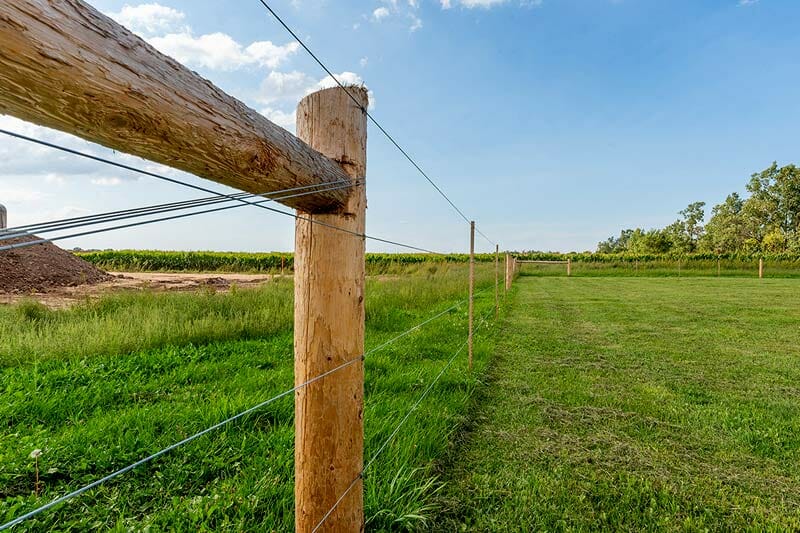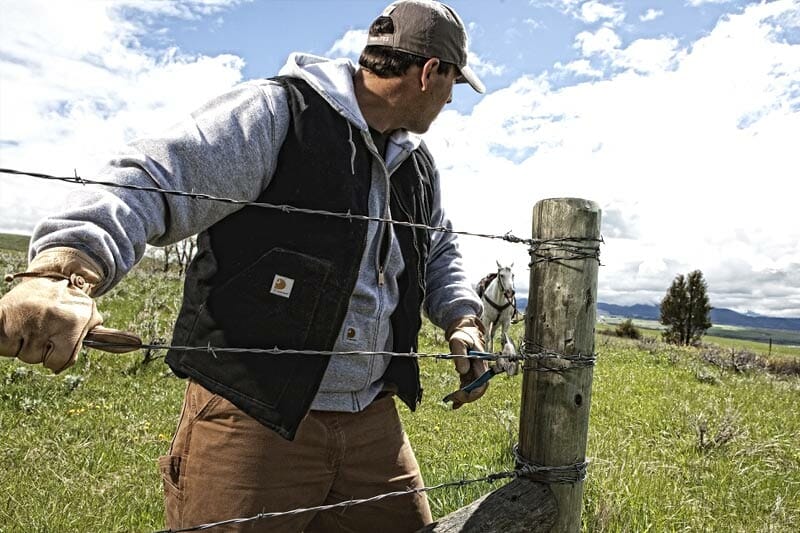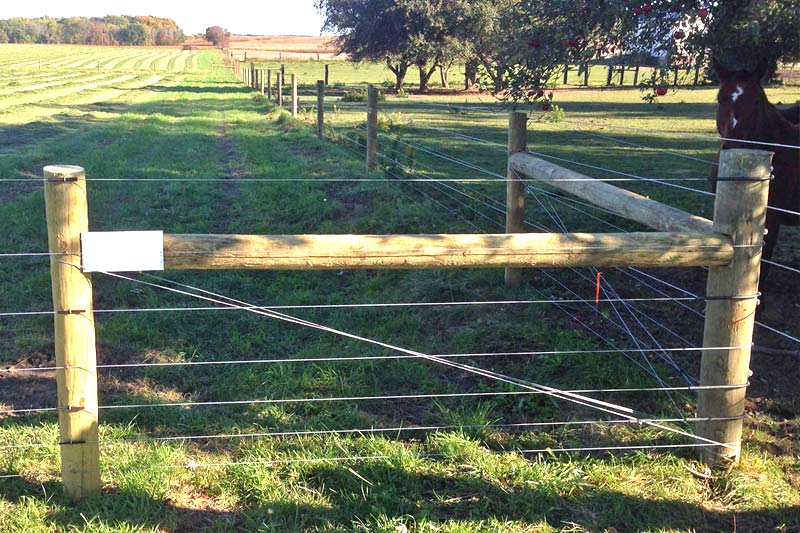Heavy-duty wire fencing provides a robust option for agricultural borders, renowned for its long-lasting nature. It is both reliable and economical in comparison to alternative wire fencing solutions, rendering it a smart selection for farm fence installations.
Making it one of the most cost-friendly options for wire fencing, high-tensile wire fencing costs $0.03 – $0.12 linear foot, regardless of its variation or type.
Being one of the most versatile wire fences, high-tensile fencing types include electric, non-electric, barbed wire, polymer, and polymer rail.
What we cover
ToggleHigh-tensile wire installation cost by type
High-tensile wire fencing is a great choice, especially for farm purposes. They can last for several years, are cost-friendly, and also have very low maintenance costs.
For your reference, below is the average cost range of the different types of high-tensile fencing:
| Fence type | Average cost range (per linear foot) |
|---|---|
| High-Tensile Wire (Electric) | $0.03 to $0.12 per linear foot |
| High-tensile Wire (Non-Electric) | $0.02 to $0.03 per linear foot |
| High-Tensile Barbed Wire | $0.03 to $0.05 per linear foot |
| High-Tensile Polymer (Electric) | $0.10 to $0.15 per linear foot |
| High-Tensile Polymer (Non-Electric) | $0.11 to $0.13 per linear foot |
| High-Tensile Polymer Rail | $0.80 to $0.90 per linear foot |
High-tensile electric wire fence

Installing a high-tensile electric fence can cost you somewhere between $0.03 to $0.12 per linear foot.
In installing this type of fence, it is important to raise the lowest wire several inches from the base to protect your animals from being harmed or you can also use a marker.
High-tensile non-electric wire fence
High-tensile non-electric wire fences can cost you a ballpark average cost of $0.02 to $0.03 per linear foot, including its installation costs.
An important point to note with this cost is that this only accounts for one strand. This means that depending on the number of strands that you want for your fence, the cost will also vary.
Professionals would suggest at least six strands for a reliable and secure fence, raising the cost to an average range of $0.12 to $0.18. This estimated cost does not include labor costs.
High-tensile wire fences tend to have lower visibility in comparison to other types of fences. This is important to note, especially when animals are prone to be harmed or injured with less visible fences.
High-tensile barbed wire fence
In installing a high-tensile barbed wire fence, the cost can fall between the average cost range of $0.03 to $0.05 per strand and per linear foot.
This variation of high-tensile fences falls under the cost-friendly category while keeping your animals safe and away from predators or intruders.
However, once you decide to install this fence, you should be cautious and careful with your livestock. Barbed wire fences have sharp barbs that can rip or tear off the skin of your animals.
On top of this caution, high-tensile barbed wire fences also require regular maintenance such as tightening to maintain the structural integrity and effectiveness of the fence.
High-tensile polymer fence (electric)
In having a high-tensile polymer fence (electric) installed, you can expect to spend between $0.10 to $0.15 per linear foot for one line.
This variation of high-tensile wire fence is on the costlier side since it takes longer to install compared to its counterparts.
Additionally, this type utilizes electricity, which makes you take into account the monthly power bills that come along with its functionality.
High-tensile polymer fence (non-electric)
A non-electric high-tensile polymer fence can cost you around $0.11 to $0.13 per single line and per linear foot to install.
This type is ideal if you want to save a few bucks, and if you prefer not to be bothered with the additional electric power bills
Polymer fences are an excellent choice for keeping livestock since it is safer and does not cut or rip your animal’s skin. They are also weather-resistant, are highly durable, and come in different colors for increased visibility.
High-tensile polymer rail fence
Installing a high-tensile polymer rail fence can cost you an average range of $0.80 to $0.90 per linear foot.
This variation uses three high-tensile polymer steel wires that are spaced evenly between fence posts, and can either be electric or non-electric.
High-tensile polymer fences are also popular for being durable, not easily broken, and are split like wood fences. Similar to split-rail fences in terms of appearance, this type can also last for over 30 years.
High-tensile wire fence construction cost
High-tensile wire fencing, regardless if it is electric or not, may cost you less in terms of materials and labor costs. Aside from the advantages in terms of cost, the high-tensile wire also has a slightly better lifespan than other wire fences.

High-tensile wire fence (electric)
- Typically, electric high-tensile fences use five strands of 12.5 gauge high-tensile wire. This is then paired with three charged and two grounded wires.
- For your reference, below is an example of the construction cost of a high-tensile electric wire for a 1,320-foot fence. The calculation of the costs is based on average prices.
| Material/Item | Amount | Average cost (per item) | Total cost |
|---|---|---|---|
| High-Tensile Wire | 6,600 feet | $0.0225 | $148.50 |
| Wood Posts (4-inch diameter) | 4 pieces | $22 | $132 |
| Wood Posts (10-inch diameter) | 6 pieces | $9.30 | $37.20 |
| Steel Posts (6.5 feet height) | 52 pieces | $3.69 | $191.88 |
| Insulators | 285 pieces | $0.15 | $42.75 |
| Springs | 5 pieces | $4.50 | $22.50 |
| Strainers | 5 pieces | $2.50 | $12.50 |
| Energizer | 1/4 | $200 | $50 |
| Cut-out Switch | 1 piece | $9 | $9 |
| Lightning Rods/Grounding | 4 pieces | $9 | $36 |
| Total cost: | $682.33 | ||
High-tensile wire fence (non-electric)
- When you would prefer your high-tensile wire to be non-electric, you would need to use 8 strands of 12.5 gauge high-tensile wire and attach them to 4-inch diameter wooden posts. Typically, these posts would need to be 20 feet apart, with brace posts of 8-inch diameter wooden posts on each end.
- To help you save costs, another alternative is to set the wood posts 30 feet apart and install two stay rods in between each post. This would reduce your costs by at least $65 per 1,320-foot fence.
- For your reference, below is an example of the construction cost of a high-tensile non-electric wire for a 1,320-foot fence. The calculation of the costs is based on average prices.
| Material/Item | Amount | Average cost (per item) | Total cost |
|---|---|---|---|
| High-Tensile Wire | 10,560 feet | $0.0225 | $237.60 |
| Wood Posts (4-inch diameter) | 65 pieces | $9.30 | $604 |
| Wood Posts (8-inch diameter) | 6 pieces | $22 | $132 |
| Staples | 10 pounds | $1.80 | $18 |
| Springs | 8 pieces | $4.50 | $36 |
| Strainers | 8 pieces | $2.50 | $20 |
| Total cost: | $1,047.60 | ||
High-tensile wire fence lifespan and other considerations
As a property owner who wants to install a high-tensile fence, you have to know the maintenance costs, depreciation costs, lifespan, and other considerations. This comes essential aside from just knowing the construction costs.
Each type of wire fence has its various lifespans and other specifics that can help you decide which type is best for your purposes.
For your reference, below are the details for high-tensile fencing.
| Description | 5-strand high-tensile wire (electric) | 8-strand high-tensile wire (non-electric) |
|---|---|---|
| Fence Lifespan | 25 years | 25 years |
| Average Annual Maintenance (calculated by % of the initial cost) | 5% | 5% |
| Maintenance | $46 | $74 |
| Depreciation | $37 | $59 |
| Interest on Investment | $37 | $59 |
| Total Cost (per year) | $121 | $193 |
| Total Cost (per foot and per year) | $0.09 | $0.15 |

High-tensile fencing cost per strand
As one of the most effective and worthwhile fencing types because of its strong characteristics and construction design, high-tensile wire fencing is also among the most affordable fence types.
Additionally, high-tensile fencing is also relatively easy to install; however, this type may require multiple strands to properly make your perimeter secure and reliable.
For your reference, below are various types of high-tensile wires as well as their average costs per strand.
| High-tensile wire type | Average cost range |
|---|---|
| High-Tensile Wire (Non-Electric) | $0.02 to $0.03 per strand |
| High-Tensile Bare Wire (Electric) | $0.03 to $0.12 per strand |
| High-Tensile Barbed Wire | $0.03 to $0.05 per strand |
| Electric High-Tensile Polymer | $0.10 to $0.15 per line |
| High-Tensile Polymer Rail | $0.80 to $0.90 |
| High-Tensile Polymer (Non-Electric) | $0.11 to $0.13 per line |
Aside from having a very strong fence, high-tensile wires are also known for not being stretchable, making them one of the most robust types. With this, animals are prevented from passing and climbing through.
High-tensile wire fences also use lesser fence posts, making you save more on the costs of purchasing and installing posts.
Installation: DIY vs. hiring a professional
Installing a high-tensile wire fence can be relatively not difficult to do, so people who are fond and familiar with DIY projects might find it completely doable without meeting bumps down the road.
However, this might not be a task for people who are unfamiliar with the tools that they can find in their shed. It may also be dangerous, especially when dealing with electric fences.
While doing it yourself can surely help you save on labor costs, it might still be best to have the project done by professional fencing experts.
DIY cost
If you decide to do it yourself, the expense to purchase the materials can cost you between $2 to $20 per linear foot. This excludes the necessary tools and equipment that are necessary for the installation.
This estimated cost can depend on the size of your fencing project, the desired height, and the specifics of your preferred high-tensile wire fence.
Hiring a professional cost
For fencing projects, hiring a professional still might be the best and smartest option since they will also come and bring their tools, equipment, and materials. This saves you time and stress from going to your local depot.
In hiring a professional, you can expect to spend between $4 to $26 per linear foot.
Other types of livestock fencing and their characteristics
Typically, property owners who have livestock to safely keep tend to prefer a type of fence to help them protect their animals in a safe space.
Sheep, pigs, goats, and others can be tricky to keep since they can easily climb over or crawl under some types of fences. Luckily, there are other types of fences that can solve this inconvenience.
With wire fences, some types are highly robust, strong, flexible, and versatile enough that you could add features such as barbs, or tweak them electrical as you please.
Below are some of the types of wire fencing and their characteristics:
| Types of livestock fences | Characteristics |
|---|---|
| Hinge Joint Fence | This type has four wrap hinge joints that intertwine the wires. Comes in various height options to help keep various animals. Also has different horizontal wire spacing to allocate different tensile strength and growth periods. Is best for safekeeping rabbits, cats, chickens, sheep, deer, and horses. |
| Fixed Knot Fence | Combining the characteristics of hinge joint fence and high-tensile steel fence, this has stronger fabrics. Can be installed faster and with less use of fence posts. Comes in various height variations. Is ideal for safekeeping cattle, camels, horses, and deer. |
| Chicken Wire Fence | Adopting the characteristics of galvanized wire, PVC coated wire, and stainless steel wire, chicken wire fences allow for an excellent anti-corrosion and durable wire fence. With steel wires that are woven into hexagon-shaped meshes, this type of fence makes a good choice for lightweight fencing. This type is ideal for keeping chicken, goose, rabbit, and garden purposes. |
| Barbed Wire Fencing | Serves as highly effective for keeping docile livestock such as cattle. Can repel animals or people away from the fence because of its pointed barbs which can prevent predators and intruders. This type is not advised for property owners who keep animals who are at risk of running into the fence and causing themselves injuries. |
| Steel Wire Hex Deer Fence | This type is metal coated with black PVC, allowing it to be the best deer fencing since it cannot potentially harm them It can offer less visibility compared to others, and is more durable. Ideals for those who keep deer who frequently damage fences from chewing. |













